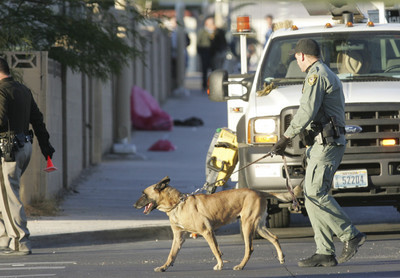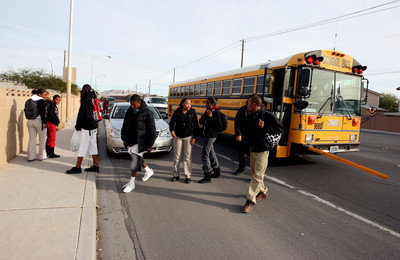Violence data not adding up
Don't look to the Clark County School District's accountability reports for an accurate measure of the violence in local high schools.
A review of data from 2006-07 shows a number of schools are grossly underreporting the number of incidents involving students suspended or expelled for violent acts directed at their peers and teachers.
Bonanza High School's accountability report documented one violence-related incident of suspension or expulsion in 2006-07. Yet during the same time frame, the Southwest Region school filed 40 recommendations for expulsion with the district's Education Services Division.
Mojave High School, a Northeast Region school still reeling from having four of its students wounded in a shooting Tuesday at a school bus stop, reported 35 suspensions or expulsions that resulted from violence against students. None were reported for violence to staff.
"That's an out-and-out lie," former Mojave keyboarding teacher Rich Whitney said Friday. "I was assaulted last year."
Whitney, 60, said he was struck in the chest by a freshman. He was attempting to stop the student after witnessing him spitting into a crowd.
"All of those numbers are way low," Whitney said of Mojave's accountability statistics. "They aren't right."
Mojave reported a total of 57 suspensions and expulsions in its accountability report. But it made 52 recommendations for expulsions alone to the Education Services Division.
District leadership appeared to be unaware of the accountability reporting discrepancies until questioned by the Review-Journal.
"Clearly there are errors," said Deputy Superintendent of Instruction Lauren Kohut-Rost, after being asked about extremely low expulsion figures reported by large high schools such as Palo Verde, Western, Cimarron-Memorial and Clark.
"Information and procedures need to be tightened up and followed," Kohut-Rost said.
The apparent underreporting will be investigated, she said.
School Board member Sheila Moulton said this was the first time she'd heard questions about the accuracy of the accountability data on suspensions and expulsions.
"As a board member, I definitely want to get to the bottom of this," Moulton said.
The accountability reports are published annually by the district and present a statistical snapshot of each school campus. Information on graduation rates, enrollment, class sizes, teacher qualifications, test scores and discipline issues are covered in the documents. The information on student discipline is drawn from the district's SASI data management system.
Both Kohut-Rost and Associate Superintendent of Education Services Edward Goldman said the problem might stem from the use of two different databases by schools in recording daily incidents, SASI and a secondary system.
At the school level, deans are responsible for entering data. If they fail to convert the information from the secondary database to SASI, then the numbers in the accountability report for that campus will not be accurate.
Flaws in the accountability reports don't mean schools aren't responding to student safety issues, Goldman said.
"To me, the important thing is that they are dealing with the incidents," Goldman said. "Keeping statistics is important, but it's more important for them to deal with the situations. If they aren't entering data, it may be because of a lack of time or competing priorities."
Moises Denis -- a parent, the president of the Nevada Parent Teacher Association and a state assemblyman -- expressed concern about the accuracy of the reports. Those are documents he has used as resources in all of his roles.
Parents need to have an accurate source of information, Denis said. Kids aren't always communicative about what's happening at school, he said.
"As parents, if we know something about it, we might be able to help do something about it," Denis said. "If we're kept in the dark, we can't do anything."
Whitney, who now teaches at the Advanced Technologies Academy, questioned whether the underreporting is an offshoot of schools trying to avoid negative attention. Under the federal No Child Left Behind Act, schools with high numbers of incidents that lead to arrests or citations can be deemed "persistently dangerous."
Goldman said no school in the district has ever received that designation. The district operates 341 schools, including 44 high schools, populated by more than 308,000 students, which makes it the nation's fifth-largest system of public schools.
In general, schools run the risk of earning "persistently dangerous" status if arrests or police citations on campus equal between 1 percent or 2 percent of student enrollment.
According to data tracked by Education Services, there were at least 4,180 recommendations from schools districtwide for expulsions last school year.
Schools made another 2,000 referrals of students to alternative schools. Most of those requests came from secondary schools, Goldman said. His figures do not include suspensions or other disciplinary actions a school might have taken independently.
Canyon Springs High School, whose campus neighbors Mojave, reported 18 incidents of violence to students that led to suspensions or expulsions in 2006-07. Data from Education Services shows the school made 80 recommendations for expulsion during that time.
Canyon Springs Principal Ronan Matthew said he would never ask or encourage any staff member to underreport data on student safety. It's possible there were mistakes in entering data into the system, Matthew said. But it's in no one's best interest to downplay the issues of student safety on any campus.
"What happens, happens," Matthew said.
He said the reporting problem is just one facet of the problem in the district's fragmented approach to student safety issues.
Last year, he unsuccessfully tried to gain approval to have metal detectors installed on his campus. Although the district uses them routinely at sporting events, he was unable to gain support from the School Board or Superintendent Walt Rulffes for using them daily.
"If you believe that metal detectors are not effective in keeping guns off campus, why are they used at football and basketball games?" Matthew said. "It's illogical."
Although Matthew questioned where student safety ranked as a district priority, Moulton was unequivocal in her position.
"Students always come first," Moulton said. "Safety is absolutely our No. 1 priority."
Contact reporter Lisa Kim Bach at lbach@ reviewjournal.com or (702) 383-0287.





























